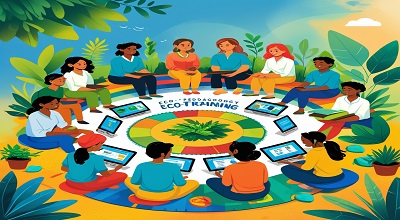Eco-Pedagogy Training
Eco-Pedagogy Training: Eco-pedagogy is an educational approach that integrates ecological awareness, sustainability, and environmental justice into teaching and learning processes. It goes beyond traditional environmental education by fostering critical thinking, activism, and a deep connection between learners and their natural surroundings.
Rooted in the works of Paulo Freire and other critical pedagogues, eco-pedagogy emphasizes transformative learning that empowers students to address ecological crises. It encourages interdisciplinary learning, where subjects like science, social studies, and ethics converge to promote sustainable living.
The Importance of Eco-Pedagogy in Modern Education
With climate change, deforestation, and pollution threatening ecosystems worldwide, eco-pedagogy has become essential in shaping environmentally conscious citizens. Key benefits include:
- Promoting Sustainability: Encourages responsible consumption and conservation.
- Fostering Critical Thinking: Helps students analyze environmental issues and solutions.
- Encouraging Active Citizenship: Inspires learners to engage in environmental activism.
- Enhancing Emotional Connection to Nature: Strengthens empathy for the environment.
Educational institutions globally are adopting eco-pedagogy to align with the United Nations’ Sustainable Development Goals (SDGs), particularly SDG 4 (Quality Education) and SDG 13 (Climate Action).
Core Principles of Eco-Pedagogy
Eco-pedagogy is built on several foundational principles:
- Interconnectedness: Teaching that all life forms are interdependent.
- Critical Consciousness: Encouraging students to question unsustainable practices.
- Experiential Learning: Hands-on activities like gardening, recycling, and field trips.
- Social and Environmental Justice: Addressing inequalities in environmental impacts.
- Participatory Learning: Collaborative projects that involve communities.
These principles ensure that education is not just informative but transformative.
Eco-Pedagogy Training: Methods and Approaches
Teachers and educators can integrate eco-pedagogy through various training methods:
A. Workshops and Seminars
- Interactive sessions on sustainability practices.
- Case studies of successful eco-schools.
B. Project-Based Learning (PBL)
- Students work on real-world environmental projects (e.g., creating a school compost system).
C. Digital Eco-Learning Tools
- Virtual simulations of ecosystems.
- Online courses on climate science.
D. Outdoor and Experiential Learning
- Nature walks, tree planting, and wildlife observation.
E. Cross-Curricular Integration
- Combining science, geography, and literature to discuss ecological themes.
Examples of Eco-Pedagogy in Practice
Example 1: Green School Initiatives
- Schools like Green School Bali use bamboo classrooms and solar energy, integrating sustainability into daily learning.
2: Community-Based Recycling Programs
- Students collaborate with local governments to manage waste and promote recycling.
3: Climate Action Projects
- Youth-led movements like Fridays for Future inspire student activism.
Example 4: Eco-Literature in Curriculum
- Books like The Lorax by Dr. Seuss teach environmental stewardship.
Example 5: Urban Gardening in Schools
- Rooftop gardens in cities like New York provide hands-on agroecology lessons.
Latest Trends and Innovations in Eco-Pedagogy
Recent developments include:
- AI and VR in Environmental Education: Virtual reality field trips to rainforests.
- Gamification of Sustainability: Apps that reward eco-friendly behaviors.
- Global Eco-School Networks: Platforms connecting eco-conscious schools worldwide.
- Policy-Driven Eco-Education: Governments mandating climate education in curricula.
Challenges and Solutions in Implementing Eco-Pedagogy
| Challenge | Solution |
|---|---|
| Lack of funding | Grants and partnerships with NGOs |
| Resistance to curriculum changes | Teacher training programs |
| Limited access to green spaces | Virtual nature experiences |
| Overemphasis on standardized testing | Advocacy for holistic assessment |
Future of Eco-Pedagogy in Global Education Systems
As environmental crises intensify, eco-pedagogy will likely become a standard in education. Future directions include:
- Mandatory climate education laws (e.g., Italy’s 2020 mandate).
- More interdisciplinary eco-courses in universities.
- Increased use of technology for global eco-collaborations.
FAQs on Eco-Pedagogy Training
Q1: What is the main goal of eco-pedagogy?
A: To cultivate ecological awareness and empower students to take action for sustainability.
Q2: How can schools start implementing eco-pedagogy?
A: Begin with small steps like recycling programs, eco-clubs, and nature-based lessons.
Q3: Is eco-pedagogy only for science subjects?
A: No, it can be integrated into all subjects, including arts, literature, and social studies.
Q4: What are some free resources for eco-pedagogy training?
A: Websites like UNESCO’s Education for Sustainable Development (ESD) offer free materials.
Q5: How does eco-pedagogy differ from traditional environmental education?
A: Eco-pedagogy focuses on critical thinking and activism, whereas traditional methods often emphasize facts without action.
Conclusion
Eco-pedagogy is a transformative approach that prepares future generations to tackle environmental challenges. Through innovative training methods, real-world examples, and policy support, it is shaping a sustainable future for education.
Free Download Link: Gana Play APK
